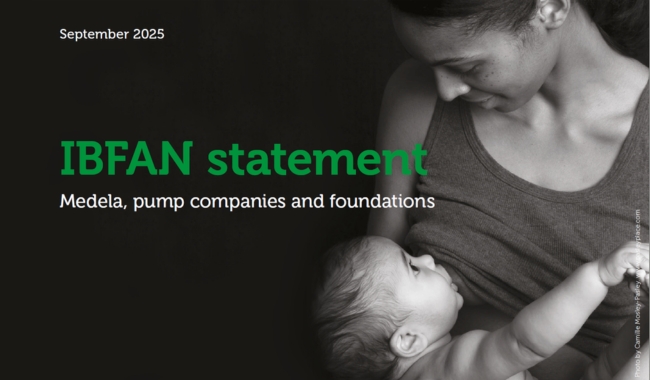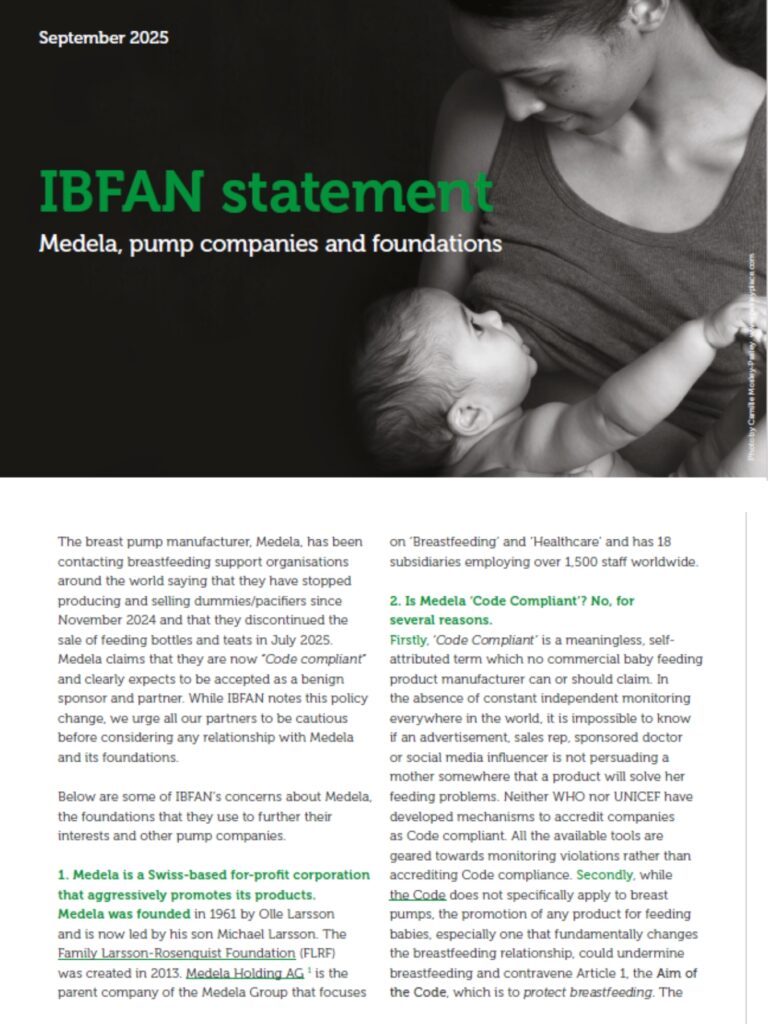Below are some of IBFAN’s concerns about Medela, the foundations that they use to further their interests and other pump companies.

1. Medela is a Swiss-based for-profit corporation that aggressively promotes its products. Medela was founded in 1961 by Olle Larsson and is now led by his son Michael Larsson. The Family Larsson-Rosenquist Foundation (FLRF) was created in 2013. Medela Holding AG is the parent company of the Medela Group that focuses on ‘Breastfeeding’ and ‘Healthcare’ and has 18 subsidiaries employing over 1,500 staff worldwide.
2. Is Medela ‘Code Compliant’? No, for several reasons.
Firstly, ‘Code Compliant’ is a meaningless, self-attributed term which no commercial baby feeding product manufacturer can or should claim. In the absence of constant independent monitoring everywhere in the world, it is impossible to know if an advertisement, sales rep, sponsored doctor or social media influencer is not persuading a mother somewhere that a product will solve her feeding problems. Neither WHO nor UNICEF have developed mechanisms to accredit companies as Code compliant. All the available tools are geared towards monitoring violations rather than accrediting Code compliance.
Secondly, while the Code does not specifically apply to breast pumps, the promotion of any product for feeding babies, especially one that fundamentally changes the breastfeeding relationship, could undermine breastfeeding and contravene Article 1, the Aim of the Code, which is to protect breastfeeding.
Thirdly, Medela is still producing products that fall under the scope of the Code. Medela bottles are now renamed as ‘breastmilk containers’ and will become feeding bottles if a teat and ring is added. Medela still continues to produce and sell ‘special needs feeders’ – a type of feeding bottle that in some countries falls under the national laws based on the Code.
3. What’s the problem with the marketing of breast pumps?
IBFAN recognises that many people find breast pumps useful, especially when maternity leave is minimal. Pumps may also have a therapeutic function, for example in assisting mothers to provide their milk for premature infants needing neonatal care who are separated from their mothers.
IBFAN’s concern is that the commercial promotion of pumps can undermine the normal breastfeeding relationship (direct breastfeeding) and the practice of hand expression (to express breastmilk when needed). In order to create the profits that owners and shareholders expect, pump companies promote their products widely to the health care sector, to the general public, to expectant and new parents who may not realise they need in-person tailored support to help use them properly.
Used incorrectly, breast pumps can damage breast tissue and cause engorgement and mastitis. It should be noted that adverse events with breast pumps are under-reported to the FDA. Dependence on funding from pump manufacturers for conferences and training can create conflicts of interest and undermine traditional breastfeeding cultures and hand expression skills. This can lead to higher rates of bottle feeding, reduced breastfeeding, increased health risks in the Global South and unnecessary financial burden to lower-income communities and families.
4. Breastmilk feeding is not the same as or equivalent to breastfeeding.
“The skin-to-skin contact supports maturing mechanisms, including
temperature control, metabolism, and diurnal adaptation. Expressed breastmilk
in a bottle is superior to formula, but direct breastfeeding is associated with
lower rates of asthma, higher presence of beneficial Bifidobacterium, and better
infant self-regulation of energy intake, thus protecting against obesity.”
Lancet Breastfeeding Series, 2023.5
Untargeted pump promotion normalises the use of pumps and in the USA breastfeeding (called nursing there) is being re-defined as ‘breastmilk feeding’.
• There are fundamental differences between breastfed milk and pumped milk. Breastfeeding is a human species-specific, tailored food for babies and young children. It is based on personalised responsiveness between a mother and her child.
• Research has shown that enabling babies and young children to feed at the breast allows their saliva to interact with breastmilk and the immune system of the mother. This interaction sends messages to the mother’s brain about what the baby or young child needs to survive and thrive. This unique physiological interaction helps ensure the provision of specific nutrition and immune bodies that support optimal growth and development and protect against illness.
• Breastfeeding provides mothers’ milk that is especially designed for the age and sex of the baby and changes its composition as the baby develops, adapting to time of day as well as during a feed.
• Breastfeeding is a natural contraceptive known as LAM (Lactational Amenorrhea Method). The hormonal suppression of the ovulation has only been studied for direct exclusive breastfeeding with no long intervals between feeds. According to the WHO, the risk of pregnancy while using this method correctly is less than 1% in the first 6 months.
5. What are the risks of partnering with pump companies and their Foundations?
Firstly: Medela and baby feeding products manufacturers understand the ‘power of association.’ Through foundations such as FLRF (if they have them), companies seek strategic alliances and partnerships with IBFAN, health professionals, researchers, institutions and breastfeeding support groups, claiming that such collaborations will improve breastfeeding rates.
Companies rarely admit that their motive is to increase the number of potential customers – the essence of any for-profit business.
Secondly: Public Private Partnerships invariably lead to ‘shared governance,’ allowing profit-making entities, with no democratic accountability, to gain a seat at the health policy-making table where they can influence policies in their favour.
Thirdly: The funding and sponsorship of research, professional associations and training materials by for-profit corporations are all forms of marketing. For IBFAN, partnering with Medela and other pump companies and their foundations would create an unacceptable conflict of interest.
6. Pumps are problematic to clean and use in emergency relief contexts.
The donation and uncontrolled distribution of pumps and related equipment is prohibited by the Operational Guidance on Infant Feeding in Emergencies (OG-IFE) v3.0 (2017).
7. The environmental impact.
Infant feeding devices and products and their packaging have inherent risks. Plastics and endocrine-disrupting chemicals increase the chemical burden of infants and young children, negatively affecting the babies’ immune, reproductive and endocrine systems.
Like any industrial product, the manufacturing of pumps leaves a carbon footprint that contributes to climate change. These problems and the chemical and plastic waste increase when pumps, bottles and teats are promoted without a real need.
8. Conclusion
IBFAN understands the funding problems being faced by our national and global partners who do so much to support and protect breastfeeding mothers. This note has been prepared in response to many requests to clarify IBFAN’s position.
In line with our funding policy, IBFAN does not seek or accept funds, donations, gifts or sponsorship from manufacturers or distributors (or their trusts or foundations) of infant and young child feeding and related products. IBFAN groups are also encouraged not to accept funding from any other for-profit companies.
The issue of whether to collaborate and attend conferences is complex and explained in our 2006 Guidance for IBFAN groups on participation in events sponsored fully or partially by companies with commercial interest in infant and young child feeding.
Footnotes
1. Switzerland Global Enterprise (S-GE) www.s-ge.com/en/company/medela-ag
2. https://www.medela.com/en/about-medela
3. Pay at the pump?: Problems with electric breast pumps. Social Science & Medicine
292 (2022) 114625 https://pubmed.ncbi.nlm.nih.gov/34891033/
4. Breast pump adverse events: reports to the food and drug administration
https://pubmed.ncbi.nlm.nih.gov/15886342/
5. www.thelancet.com/series/breastfeeding-2023
6. https://www.nature.com/articles/s41598-018-33519-3
7. https://llli.org/news/lactational-amenorrhea-fertility-birth-control-and-breastfeeding/
8. https://www.babymilkaction.org/archives/37896
9. www.ennonline.net/about/ife-core-group-history-and-intent
https://iycfehub.org
The International Baby Food Action Network (IBFAN) is a global coalition of over 300 civil society organisations that works to protect maternal, infant and young child health from commercial misinformation. The high mortality of bottle-fed babies the 1970s prompted shareholder actions, legal trials, consumer boycotts and a US Senate Hearing into the marketing activities of the baby food industry. A joint WHO/UNICEF meeting on infant and young child feeding in 1979 recommended an international code to regulate the marketing of baby feeding products. IBFAN has worked since then to help governments bring that Code into legislation to protect, support and promote breastfeeding and optimal complementary feeding.
Click on the image to download the full PDF of the document IBFAN Statement – Medela, pump companies and foundations


